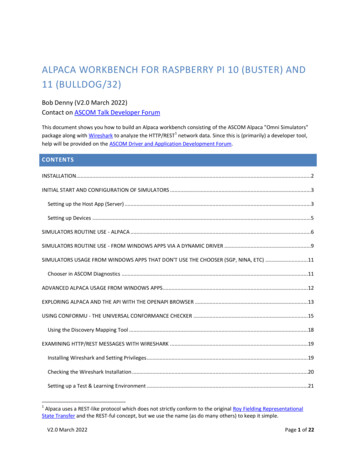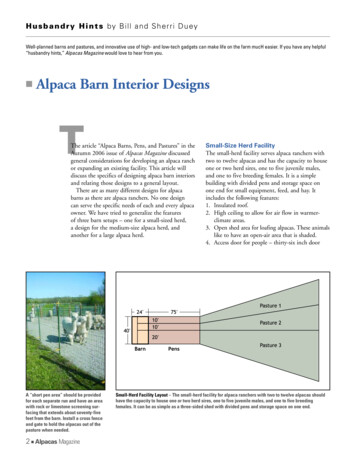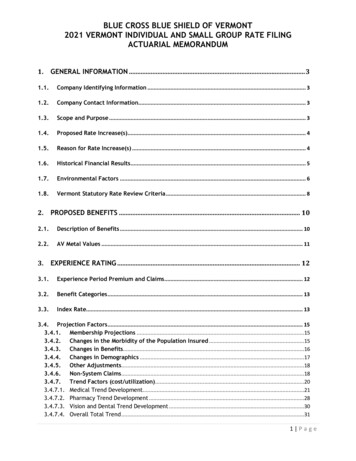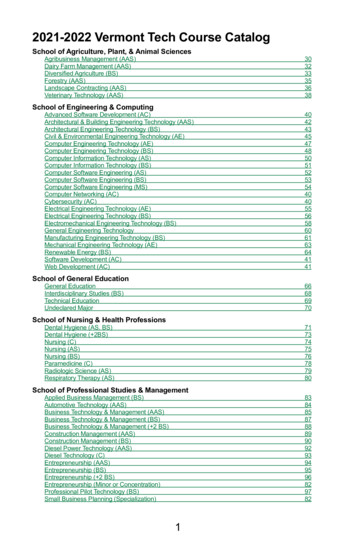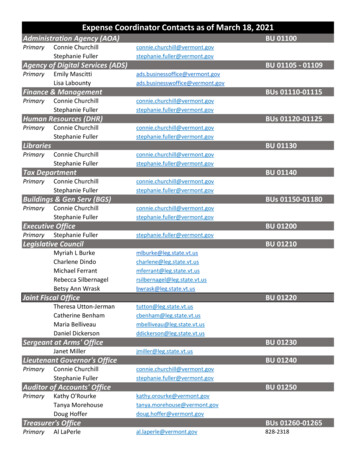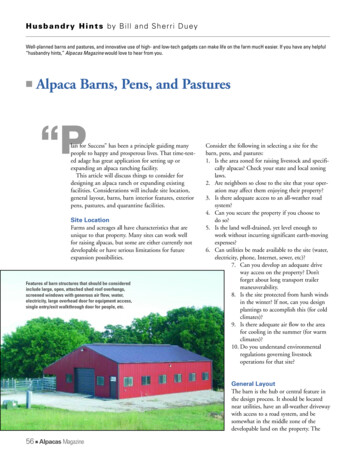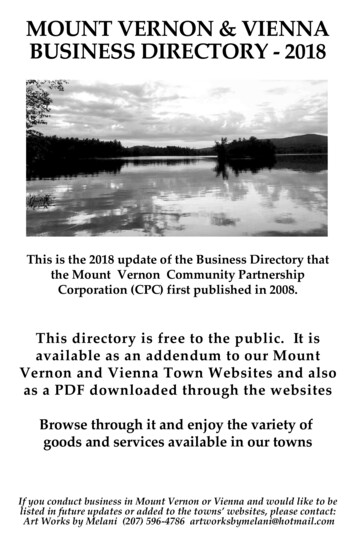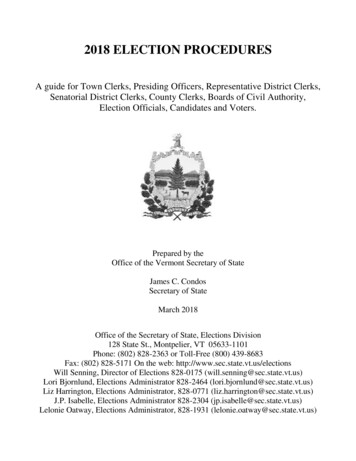
Transcription
Alpacas as Food Animals:A Vermont PerspectiveKRISTIN M. HAAS, DVMSTATE VETERINARIANDIRECTOR, FOOD SAFETY & CONSUMERPROTECTIONVERMONT AGENCY OF AGRICULTURE, FOOD ANDMARKETSUSAHA Meeting Providence, Rhode Island10/25/2015
Issue Alpacas are being slaughtered in the northeast, andperhaps around the country, with increasing frequency There is a lack of regulatory, diagnostic and bestmanagement practices guidance to support this activity The lacking infrastructure has ramifications for allparties involved State meat inspection programsAccredited veterinariansCamelid ownersConsuming publicUSAHA Meeting Providence, Rhode Island10/25/2015
Federal Background Alpacas are not amenable to the FMIA/not exotic species; bydefault, they fall under the regulatory jurisdiction of FDA USDA is mandated by the FMIA to inspect domestic cattle, sheep, swine,goat, equine, ratites, guinea fowl, squab and domestic chicken, turkeys,ducks, and geese, and the meat products of those animals, slaughtered infederal establishments that are intended for distribution in commerceGame animals and their products are not addressed under the FMIA andPPIA and, therefore, fall under the jurisdiction of the FDA and itsstatutory authority provided by the Federal Food, Drug, and CosmeticAct (FFDCA). These non-amenable meats may be voluntarily inspected(fee for service) by USDA under the USDA Agricultural Marketing Act of1946.The FDA/Center for Food Safety and Applied Nutrition (FDA/CFSAN) isresponsible for protecting consumers against impure, unsafe, andfraudulently labeled foods covered by the FFDCA and to assureconsumers that foods are wholesome and produced under sanitaryconditions.USAHA Meeting Providence, Rhode Island10/25/2015
Vermont Background Vermont’s hobby camelid industry has decreased in size overtime – result is an increased number of unwanted alpacas inthe area Alpaca rescuesAlpaca animal welfare concernsLivestock auction marketsInternet sales Concurrently, some alpaca owners have explored foodproduction opportunities as a method of recuperating costsassociated with raising alpacas Vermont has a thriving local-vore, value-added food production industryOwners want to slaughter alpacas under inspection due to marketdemands even though not required by FMIAVT Department of Health requires that product originate from an“approved source”, and state inspection allows establishment to qualifyas suchUSAHA Meeting Providence, Rhode Island10/25/2015
Vermont Background Late 2013 – accredited veterinarian contacted VT Agencyof Agriculture to inquire as to her ethical/professionalresponsibilities when working with owners who areinterested in shipping alpacas to slaughter Multiple verbal, email, and telephone conversations wereheld with FDA (CFSAN; CVM Division of Compliance),FSIS, VT Congressional Delegation to ID gaps anddiscuss mechanisms for moving alpaca slaughter underregulatory oversight of USDA-FSIS: Petition under the authority of 9CFR392 create a voluntaryinspection program under the Agricultural Marketing Act.Petition for this meat to be included as an amenable species underthe Federal Meat Inspection ActUSAHA Meeting Providence, Rhode Island10/25/2015
Challenges No drug or vaccine is approved for use in alpacas.Administration of medications is considered to be anextra-label use and must conform to ELDUrequirements. Veterinarians have significantresponsibility under AMDUCA/Veterinary FeedDirective. There are no FDA-validated tissue residue testsavailable in the U.S. for use with alpacas. There are no established tolerances for any drugadministered to alpacas, so any residue detection isconsidered illegal.USAHA Meeting Providence, Rhode Island10/25/2015
Challenges FARAD prefers to recommend medication withdrawaltimes on a case-by-case basis, as these recommendationsmay change based on the dosing or the individualcircumstances and because there is very little to no dataon the drugs in alpacas. Better than nothingNot a cost effective means of gathering data for consistent use The withdrawal times recommended are merelysuggestions of minimum withdrawal times and should beextended if the animal receives higher than the listeddose or if it is severely systemically compromised.USAHA Meeting Providence, Rhode Island10/25/2015
Challenges Alpacas have not historically been considered foodanimals by owners, primary care/referral veterinarians(including universities), and industry organizations Camelid industry is generally not comprised of traditional farmersVeterinarians routinely disregard the concept of meat withhold timesand prescribe medications that have long withdrawals(aminoglycosides) and prohibited drugs (quinolones)Alpacas are routinely medicatedAntibiotics/anti-inflammatory medications as needed for illness Ivermectin monthly for prevention of meningeal worm in the easternUS. Owners often acquire medications from feed stores and the internetand administer outside of a valid V.C.P.R.USAHA Meeting Providence, Rhode Island10/25/2015
Challenges Websites and Facebook are often the main sources ofinformation available to alpaca owners. Craig’s List – rescue alpacas that subsequently go to slaughter – nomedical history/accountabilityFly-by-night meat withdrawal time “experts” willing to provide“assistance” for a fee Industry denial; unwillingness to consider paying for anyresidue testing that may be helpful. Value-added products Custom exempt products are sometimes mixed with inspectedproduct during processing and sold into commerce (custom exemptpork fat mixed with alpaca meat for sausage production). This mayresult in illegal movement of uninspected value-added productacross state linesUSAHA Meeting Providence, Rhode Island10/25/2015
Current Status Vermont State Meat Inspection Program is currently offeringinspection services for those interested in alpaca slaughter Fee for service payable by establishment requesting inspection(hourly inspectionrate and portal to portal)Carcasses stamped with the state exotic brand upon passing inspectionProduct labeled with a pre-approved state label bearing all required features ofan official label except that the exotic legend will be used to allow for interstatemovementEstablishments must follow all SSOP (sanitation) procedures and document as ifproducing amenable productEstablishments are expected to follow good commercial practices as laid out in 21USC 110 and general good manufacturing practices to produce products that arenot contaminated or adulterated within the meaning of the State Meat andPoultry Inspection ActEstablishments are expected to follow their residue avoidance protocols to assurethat products produced are not adulterated.As a food producer of an FDA regulated product, establishments are required toregister with the FDAUSAHA Meeting Providence, Rhode Island10/25/2015
Vermont Concerns Adulterated food products enteringcommerce – public safety concern? Liability for state meat inspection program Liability for attending/referral veterinarian Public perception / bad press associatedwith lax practicesUSAHA Meeting Providence, Rhode Island10/25/2015
Next Steps? Education of/outreach to all sectors Data acquisition Petition to effect change Synchronization of messaging between FDA andUSDA-FSIS Guidance offered to attending veterinarians Hold industry accountable USAHA resolution on this issue?USAHA Meeting Providence, Rhode Island10/25/2015
Questions?USAHA Meeting Providence, Rhode Island10/25/2015
Vermont Background USAHA Meeting Providence, Rhode Island 10/25/2015 Vermont's hobby camelid industry has decreased in size over time - result is an increased number of unwanted alpacas in the area Alpaca rescues Alpaca animal welfare concerns Livestock auction markets Internet sales Concurrently, some alpaca owners have explored food
